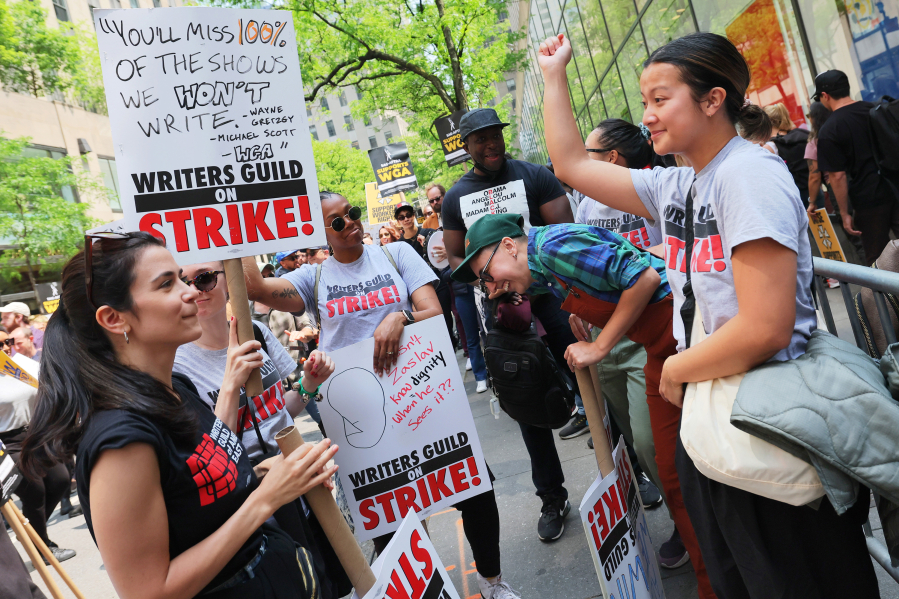On a frigid early morning in Chicago last week, screenwriter Michael Gilio bundled into a car in the city’s West Side with other writers and made his way to Cinespace studios, located in an industrial zone.
Gilio, a strike captain for the Writers Guild of America, heard that Showtime’s coming-of-age drama “The Chi” was planning to resume filming its sixth season at 4 a.m.
So he and his colleagues sprang into action. They fired off emails to other guild members in the area, hoping some might turn out in the early hours. They needed two picketers at each of the three studio gates to form official picket lines. By 3 a.m., more than 15 writers showed up, including “The Matrix” co-writer and co-director Lilly Wachowski.
Teamsters driving trucks loaded with production equipment turned their vehicles around and shouted support for the picketing writers. “The Chi” crew members who showed up also refused to cross picket lines. And by 8:45 a.m., the writers got word that “The Chi” had been shut down.
“We did not anticipate doing boots-on-the-ground direct action, and it’s been really galvanizing for those who participated,” said Gilio, 50, a screenwriter for the recent movie “Dungeons & Dragons: Honor Among Thieves.” “Our members out here are much younger and energized, and more politically active than back in the old days. There’s a lot more fight going on.”
The focus on shutting down individual productions such as “The Chi” reflects the more aggressive tactics used by Writers Guild members compared to the previous strike 15 years ago, when there was more emphasis on large mass protests and rallies intended to build union solidarity.
Unlike during the 2007-2008 strike, which occurred in the middle of the TV season, this strike happened after most productions had already wrapped and studios had more time to prepare for a walkout. Still, dozens of shows and movies have been forced to halt or delay production, some because showrunners refused to work; others because of impromptu pickets like the one targeting “The Chi” that one writer described as “guerrilla tactics.”
These protests, although sanctioned by the union’s leadership, often are organized by rank-and-file members with the help of social media.
“We didn’t know how much appetite people would have for it,” WGA East Executive Director Lowell Peterson told The Times. “We tried it out and quickly found a lot of enthusiasm. The grassroots support is inspiring.”
Since the writers’ strike began on May 2, the WGA has organized large pickets outside the headquarters of the major studios to protest what they describe as the steady erosion of their members’ incomes during the streaming era. The Alliance of Motion Picture and Television Producers, which bargains on behalf of the major studios and networks, said it offered “generous increases in compensation for writers as well as improvements in streaming residuals” but that the guild’s demands over mandatory staffing levels and duration of employment remained sticking points.
In addition to the studio pickets, the guild also has organized protests around television’s upfront ad market in New York in addition to the targeted production pickets intended to halt or disrupt filming on location.
On the East Coast, the WGA has interrupted another Showtime production, “Billions,” and Max’s “The Penguin.”
Earlier this month, the WGA said early morning pickets at York Studios in the Bronx and Westchester halted Apple TV+’s “Severance,” as members of IATSE and Teamsters declined to cross their picket lines. The same day, the union was picketing at sunrise at Silvercup Studios East in Long Island City to block filming of Disney+’s “Daredevil: Born Again,” the WGA said on Twitter.
In Los Angeles, the union’s pickets have halted shoots for Apple TV+’s “Loot,” the drama series “Good Trouble” and the Lionsgate movie “Good Fortune.”
In these production protests, the writers often rely on Twitter to quickly call out for reinforcements of their picket lines and to corral picketers to new filming locations they have sussed out.
“The WGA has been able to interrupt several productions that were shooting on location,” said entertainment industry attorney Dan Stone, a partner at Greenberg Glusker. “Location shoots often have few points of entry, and the WGA has been able to quickly establish picket lines. This has enabled members of other unions to report to work but then refuse to cross the picket line.”
Such production shutdowns can cost producers hundreds of thousands of dollars in lost equipment rentals and other charges.
Representatives of Warner Bros. Discovery, Walt Disney Co. and Lionsgate declined to comment, as did the AMPTP. Apple didn’t respond to requests for comment.
In the months prior to the current strike, writers analyzed what they did in 2007-2008, Peterson said.
“There was much more of an emphasis on the public-facing pickets last time … much more oriented towards building solidarity among our own ranks and showing the world that we were united,” Peterson said. “There wouldn’t have been an upfront strategy. And I don’t think there was a production strategy.”
Writers believe their actions are having a chilling effect on the studios’ plans.
Zayd Dohrn, 45, one of the strike captains who organized the “Chi” shutdown, said they have heard that other shows abandoned filming plans after what happened.
“And that’s the point,” he said. “It’s about bringing the strike to a close as quickly as possible.”
The WGA also has drawn key support from other entertainment unions, especially Teamsters and the International Alliance of Theatrical Stage Employees, which represents set workers.
“There’s more solidarity this time around than there has been in the past,” said former Teamsters Local 399 secretary-treasurer Steve Dayan. “(IATSE) is honoring picket lines, the Teamsters are honoring picket lines. (Writers are) being more effective.”



